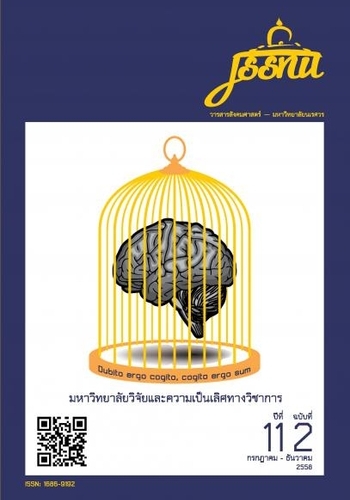Applying Grounded Theory to the Study of Persons Displaced from Fighting in a Temporary Shelter, Thailand
Main Article Content
Abstract
Like other Southeast Asian countries, Thailand has always been a nation of ethnic diversity. Being diverse and having complex structures, Thailand is a ‘pluralist society’ and can be understood better in terms of ethnicity and ethic relations. However, for a long time, the absence of theoretical discussion of ethnicity and cultural identity in Thai studies and in much of Asian studies in general also neglects the existence of ethnic diversity of people. Moreover, misunderstanding by some social scientists creates discourse by making them out to be merely ‘minorities’ or ‘marginal’ in their own region (Gladney, 1998: 1-9). The authors carried out a study of persons displaced as a result of fighting (PDF) in a temporary shelter in Thailand. They applied grounded theory within the study through in-depth interviews and participant observation to collect data from the target populace. Then, they analyzed data by using content analysis, method of agreement, and narrative technique. The data are presented in the form of narrative description and social mapping. The authors criticized the negligent development policy of Thailand concerning human trafficking. The results showed that PDF in the temporary shelter were trafficked because of three major factors: 1) low quality of life from the Shelter’s poor management and limitations of resources; 2) no state strategic policy concerning human trafficking; and 3) vulnerable status of PDF as ‘stateless’ people. The authors suggested that to prevent problems of human trafficking, Thailand needs to reconsider current shelter’s management and develop a clearer definition of what is now called ‘temporary’ status of PDF. To build a sustainable socio-economic development in Southeast Asia, it is crucial for state governments to intervene. First, they need to improve laws and regulations relating to human trafficking, especially those occurring during the transit process. The loss of life, injuries and enforced disappearance of PDF needs to be stopped. Second, governments need to play a crucial part in improving shelter’s management by providing policy recommendations and improve their strategic cooperation with the United Nations High Committee of Refugee Agency Thailand (UNHCR) and other agencies. Third, a clearer definition of the term ‘temporary’ is needed. Fourth, they must allow PDF to take parts in regional development, so that they have equal accessibility as global citizens in capacity building programs for improving their communication skills, working skills, and socio-cultural skills as a priority.


